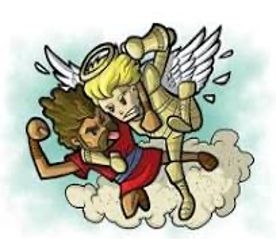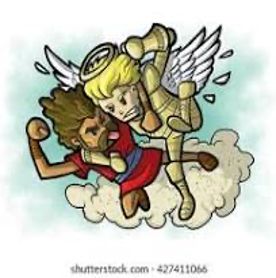12/05/2024 Torah Commentary

שאלו שלום ירושלים
Pray for the peace of Jerusalem
Orad por la paz de Jerusalén
The name of this week’s parashah is “VaYishlach: meaning: “He sent forth.” You will find it in the Book of Genesis: 32:4-36:43. The parashah revolves around Jacob’s maturation and spiritual growth. Perhaps the section’s most famous tale is that of the battle between Jacob and what is called in Hebrew “the ish.” The Hebrew word “ish” is a complex word meaning: “a divine being,” or “another person”, or even “oneself”. Due to the text’s ambiguity, we are faced with an intellectual quandary. Exactly with whom or what is Jacob fighting? Is the text’s lack of clarity meant to force us to wrestle with its meaning just as Jacob had to wrestle with the ish?
This tale also presents us, for the second time, with the idea that Jacob seems to have a habit of “holding onto or grabbing onto” another being. We note that Jacob facilitated his birth by holding onto Esau’s heel, now he wrestles with the “ish” and refuses to let go until he receives the ish’s blessing. (32:27). What is the text teaching us by this holding on; by this wrestling match? Is the text teaching us that Jacob has finally come to realize that he must take responsibility for his future actions, that he cannot ride on others’ coattails forever?
Reviewing Jacob’s life, we see a man who begins life as a schemer. Now as he prepares himself to re encounter his brother by crossing the River Yabbuk both physically and spiritually we meet a man who has come to realize that in life cleverness is not enough. Jacob must grapple with the fact that humans must balance their need for the tangible with their need for the spiritual. Does Jacob’s wrestling with the “ish” represent this realization? Is Jacob symbolic of every human being and the fact that each of us must wrestle with our own humanity and frailties? Did Jacob come to understand that he need balance between the daily actions of life and the eternal spiritual side of life?
In this week’s parashah we note that in life’s struggles between the sense of self-knowledge and the knowledge of the other, Jacob comes to realize that to find G-d one must seek G-d. Might this be the reason behind his name change from Jacob (holding on to another) to Israel (struggling with the Divine)?
From this point until the end of the Hebrew Bible two themes will be ever present, the theme of the “I” in contrast to the “we” and the question of how do we resolve the struggle between our sense of self and our sense of the other, between the tangible and the spiritual?
In this text Jacob had to learn how to trust in the goodness of G-d and at the same time accept the need to be self-sufficient. From that perspective Jacob represents each of us. How do you answer these questions? What do your answers tell you about who you are?
YouTubes for the week
Leonard Cohen’s Hallelujah in Five languages
Idish
Hebrew
Spanish
French
Chinese
Please pray for Israel’s soldiers and the safe return of all of the remaining hostages.

